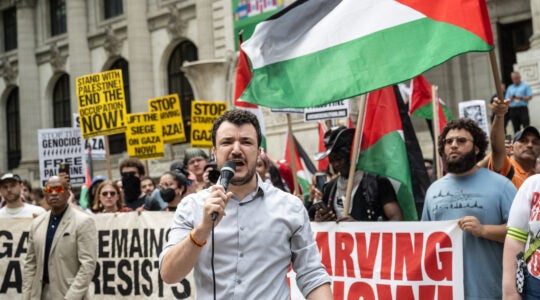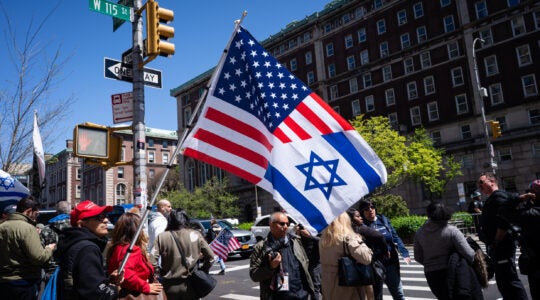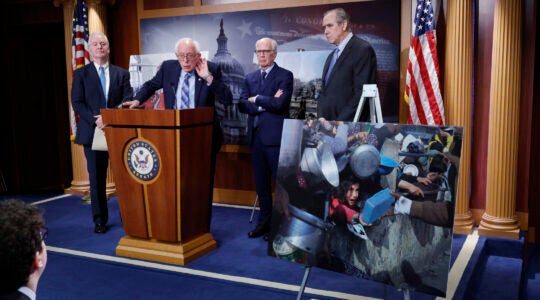BOSTON (JTA) — To critics, the one-state conference held at Harvard University was a thinly veiled assault on the legitimacy of the Jewish state.
To organizers, the condemnations and calls on Harvard to cancel the conference amounted to thinly veiled attempts to silence any criticism of Israel.
In the end, “Israel/Palestine and the One-State Solution” — arranged by a group of graduate students at Harvard’s Kennedy School of Government and held at the university — held few surprises.
Activists and academics came together over the weekend to talk about how the Israeli-Palestinian conflict is a colonizer-settler relationship. A handful of pro-Israel activists stood outside the Kennedy School bearing signs that read “Shame on Harvard, Haven for Jewish Hatred.” Organizers declared the conference a success, while critics denounced it as a sham.
“The reality is, no matter what the conversation, if it’s critical of Israel, the response is the same,” Israel-born Elisha Baskin, one of the conference organizers, said of criticism of the event. Baskin is a research fellow at the Kennedy School and a graduate student at Brandeis University.
The fact that the conference took place at all — and at Harvard, of all places — may have signified a possible new front developing in the campus wars over Israel.
Until now, most of the campus agitation over Israel has centered on the campaign for Boycott, Divestment and Sanctions against Israel known as BDS. But the Harvard conference, and the intensity with which opponents fought to derail it, suggests a great anxiety among pro-Israel groups about the one-state solution turning into a new anti-Israel rallying cry on U.S. campuses.
“To the extent that the idea of a one-state solution is gaining currency, it is important to fight this line of thinking,” said Rob Leikind, director of the American Jewish Committee’s Boston office.
In the weeks leading up the event, pro-Israel groups sought to discredit the conference as an exercise in delegitimizing Israel, and Sen. Scott Brown (R-Mass.) called on Harvard to cancel the forum.
For its part, Harvard issued several statements clarifying that it was organized by students and received only a small amount of financial support from the university, as do other student conferences.
Kennedy School dean David Ellwood said, “We would never take a position on specific policy solutions to achieving peace in this region, and certainly would not endorse any policy that some argue could lead to the elimination of the Jewish State of Israel.”
Ellwood also expressed disappointment that the lineup of conference speakers was one-sided.
Not all Harvard faculty members opposed the conference.
“As a Harvard faculty member, I am extremely proud that this conference in happening here,” Harvard law professor Duncan Kennedy said in his opening remarks as its first speaker.
Kennedy, who said he felt jealous when similar conferences were held at other colleges, was among some two dozen speakers — academics and political activists — who addressed the audience of 300 or so at the conference Saturday and Sunday. Organizers said the goal was to open up serious dialogue about alternatives to the two-state solution, but the lineup included a who’s who of academics, activists and officials who have made careers out of attacking the notion of a Jewish state.
Speaking at the conference, Ali Abunimah, co-founder of Electronic Intifada and author of the 2006 book “One Country, a Bold Proposal to End the Israeli-Palestinian Impasse,” denounced the two-state solution as an attempt to preserve Israeli Jewish power.
“Any discussion of a political solution must at its core be a discussion about ending the system of colonial and racial power and privilege and replacing it with a system based on full human rights for all who live under it,” Abunimah said.
Boston University law professor Susan Akram talked about how “Israel’s claim of a state, on the basis of exclusive and discriminatory rights to Jews, has never been juridicially recognized. In other words, the concept of the Jewish people as a national entity with extraterritorial claims has never been recognized under international law.”
Other speakers included Rabbi Brant Rosen, a congregational rabbi from Evanston, Ill., who is co-chair of the rabbinical council of Jewish Voice for Peace, which favors BDS; Dalit Baum, co-founder of Who Profits from the Occupation; and Ilan Pappe, a history professor at the University of Exeter who argues that Israel engaged in concerted ethnic cleansing during the establishment of the state in 1948.
One of the few defenders of the two-state solution was Stephen Walt, a Kennedy School professor whose 2007 book “The Israel Lobby and U.S. Foreign Policy” was denounced by many Israel supporters as borderline anti-Semitic. Walt said at the conference that he has not given up on the idea of two states for two peoples.
Students at Harvard were of mixed minds about the conference. Some circulated a petition to have Harvard withhold funding from the conference. But Joshua Lipson, co-president of Harvard Students for Israel, said he fully supports students’ rights to expression and disagreed with those who called for Harvard to withdraw financial support from the conference.
A few Israeli students who attended the conference said that while they disagree with the one-state solution, it’s a legitimate topic for academic discussion.
That, said Ahmed Moor, one of the main student organizers of the conference, was the whole point of the exercise.
“Many people on both sides recognize that the two-state outcome may not be as viable as it once was,” said Moor, who was born in a refugee camp in the Gaza Strip, where his family continues to live. “We have to begin to think of creative ways to live together.”
JTA has documented Jewish history in real-time for over a century. Keep our journalism strong by joining us in supporting independent, award-winning reporting.





